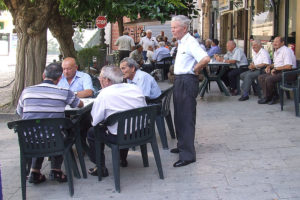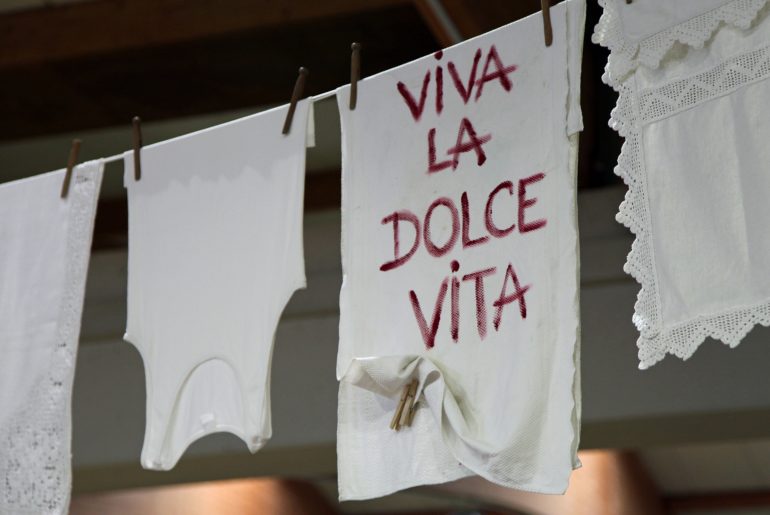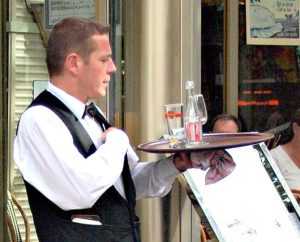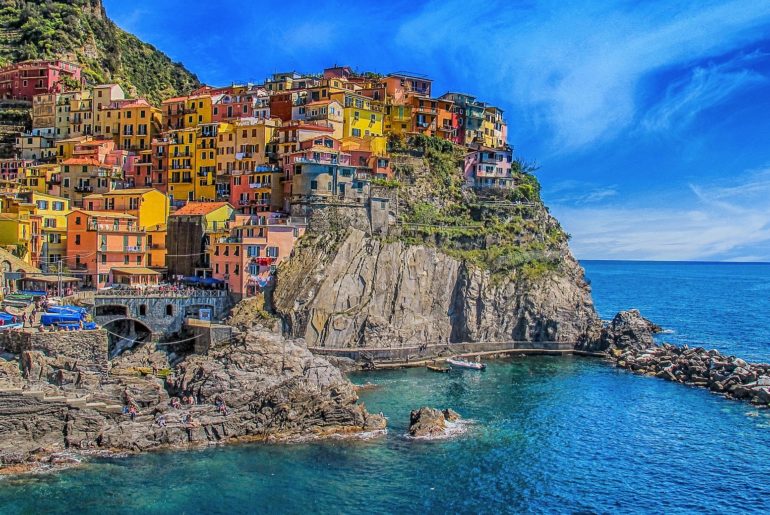Italian Cultural Habits. Some things you just need to know.
Cultural Habits, thats right. Italians are different in that way. You are heading to Italy and are excited about the food and the wine you will enjoy. You can’t wait to step back into time. Walk the streets that the ancient Romans walked. See the art from great artists and relive the history. You want to experience Italy through the eyes of Italians.
If that is the case, there are some things that you should know. Just so you don’t stand out, or at least so that you can understand why Italians do the things they do.
After all when in Rome…
-I know that it’s odd, but in Italy waiters serve bread to the table without oil and balsamic and for sure they will never ever bring you butter.
Bread is essential to any dinner or lunch table. Its primary purpose is to have it with the meat dishes, secondi, or to snack on before the pasta arrives. And for a traditional scarpetta; Cleaning off the plate of the tomato sauce with a chunk of bread after finishing your pasta. Avoid eating your pasta with bread, though. That would scream horror and definitely labels you as “another tourist.”
-Italians always end their meals with a caffè espresso. In some cases, individuals may choose an espresso corretto which means, corrected with a splash of grappa or brandy. At times, but very rarely, someone may ask for a macchiato or a drop of cold milk. Never would they have a cappuccino after a meal. You will definitely get a sarcastic comment from the waiter or at the very least an insulted look.
Cappuccino is a meal in itself for Italians as it is the choice of beverage for breakfast, by itself or with a cornetto or brioche. Sometimes they have it in the afternoon . But after a three course meal it’s a total no, no… nooooo!
Un caffe’ per favore
-Coffee in Italy is a culture and it’s enjoyed several times daily. Unlike in North America where we tend to sip a 20oz for several hours, Italians prefer to have it al banco (at the bar counter), down it and move on with their day, or at least until the next one. Because they are a sociable society they often invite someone to have a caffè with them and to share a few words before they all go their separate ways. It’s an inexpensive commodity and easily offered to friends and acquaintances. Its not just a cultural habit. It’s a daily one. Of course if coffee is not your choice there is always room for a gelato. One a day keeps the doctor away!

– Avoid dining with milk. Even children do not have milk with meals. The number one choice of beverage at during a meal is… water! Still or sparkling, but definitely water. You will be charged for it, too. In a pizzeria a bibita gassata (soft drink) is sometimes enjoyed with a pizza, especially for the little guys. At least if you do ask for a soft drink, you won’t get any weird stares.
Wine with your pizza? Really?
Wine on the other hand is not recommended with a pizza. No funny faces from the waiter if you do. Italians mostly enjoy beer with it. Order a glass of milk and you’ll never hear the end of it. Dining with a cocktail is almost as bad as ordering milk or juice. Have your Martini or Campari as an aperitivo but move on to wine as soon as you are seated.
-You will notice that at 6 or 7 in the evening, many bars are crowded with aperitivi goers. It’s sort of like happy hour if you will, but here you can have food that is all free as long as you order a drink. Here is where you would have an aperitivo, pile onto your plate a few samples of different specialties and enjoy the food and the conversation.
Maybe tomorrow
-Italians have certain habits down to an art. It’s not a coincidence that every other country in the world looks at Italians with envy when it comes to living life. They definitely have defined and perfected a few phrases. “La dolce vita” (the sweet life) and “Il dolce far niente,” (the sweetness of doing nothing at all). Two quotes that define the Italian love for life and the recognition that constant running around and being too busy is not always necessary, nor is healthy.

Many foreigners may see that as being “lazy” but, considering the country and its peoples’ achievements over the centuries, that argument hardly stands. Maybe it wouldn’t hurt for others to adopt some of these habits, particularly when traveling in Italy. But hey, why not take it home and add it to your everyday life too.
-Italians don’t like fast food restaurants as they don’t give enough time to engage in conversation and enjoy the food prepared, which also means that they prefer eating in company. It’s hard to talk about the food if you are the only one at the table or if everyone is in a rush.
Ciao come stai? Let’s go for a caffe’
– Italians put so much emphasis on general conversation. There is nothing more rude in Italy than to cross someone on the street and say “Hi how are you!?” And then just keep on walking (as we might do in North America). If you ask, expect an answer and a long conversation. People congregate on the sidewalks, in the piazza, under the portici or at markets. They always find a subject to discuss. They may just ask about family and life in general. So slow down and do enjoy the small things in life.

-Family is an important aspect of their lives. In some cases, no wage increase is enough to move away from close family. As I recall, a very good friend of mine refused a substantial wage increase because the heartache of his daughter being raised too far away from the grandparents just wasn’t worth the money or the 800 kilometre move. Life is too short, simply put.
-Kids are brought up around wine and spirits and because of that they grow up with little interest in drinking. Since they don’t drink milk, juices or soft drinks at meals, often their parents may add a drop or two of wine in the water, but mostly they drink plain water. Children are always surrounded by wine, and often snob it as they get older.
-Children are in constant contact with adults. What I mean is that children are not overlooked when adults are invited to dinners or parties. Unless otherwise stated, expect them to bring their bambini to a friend’s dinner. If they show up without their kids, the host would be surprised and question why they aren’t present.
3 Unique Experiences of Art and Culture in Italy
Ciao Bella. Where are you going?
-Because Italians live in the cities and in apartmentrs, they love to spend their time outside. The weather is a big help, even in the winter. Spending time outdoors regenerates their well-being. Fresh air is a luxury when you live in the city and the outdoor is precious. It’s not difficult to find kids, elders and teens congregate outside and enjoy one another’s company in parks, on boulevards or in a piazza. Sunday is a family day and short trips visiting neighbouring towns for long lunches are quintessential for their dolce far niente lifestyle. As well evening passeggiate, strolls to the town centres.
-Dressing up is very important for Italians. I read an article years ago that Italians are the number one buyers of signature clothing and like to show them off. Signature handbags are the number one accessory amongst women and wallets for men, mostly Italian designers, but not necessarily. If they are going to buy something, it’s going to be a renowned griffe.
…And just to be fair.
Here are some things that foreigners dislike, don’t appreciate or don’t understand about Italians. And why not? After all, not everything that glitters is gold, and even a wonderful place like Italy has its faults.
-Noise. Italians are… noisy. They are loud, they yell. And not because they are mad or upset, but simply because they believe that yelling gets the point across better. They love the horn on their car. If it’s there, use it!. They love to use hand gestures when talking. It’s nothing personal, but to them it’s not rude to talk loud and with lots of hand and finger gestures.
Lets go for lunch
– Italians hate fast food, but tourists also dislike the fact that Italians take forever to finish their meals. Since they would rather take their time to eat, Italian life in general stops around lunch. Stores close for 3 or 4 hours during the middle of the day. Banks stay closed until 4pm and even gas stations shut down for lunch. Of course restaurants are open, but only until 2:30pm. If you choose not to eat during that time, you’ll have a difficult time finding a restaurant that is open.
It’s closed? Why is it a holiday?
Tourists, especially North Americans, want everything at their finger tips. In Italy, it doesn’t work that way. Restaurants close at 2:30pm and don’t open again until 7 or 8 pm. Stores, boutiques, banks, government offices, gas stations and even factories all close down for lunch and some don’t even reopen in the afternoon.
Naturally, if you are in an area with lots of tourists, you will have everything at your fingertips. Everyone caters to tourists and almost everything is always open, but is that really the Italy vibe that you are looking for?
Two sunny side up please. Or not!
-Foreigners dislike Italian choices for breakfast. Lunch is the biggest meal, there is no need for a massive breakfast. Unless you are staying in a franchise hotel where continental breakfasts are served, many places will offer a cappuccino with a few different white flour breads with jams, cookies or brioche and that’s it. Bars or caffè will serve pastries and maybe panini in the morning, but if you are looking for bacon and eggs, well… good luck.
-Italians are romantic people so don’t be alarmed or offended if you see couples kissing and hugging in public on their Vespa or on a park bench. When young couples are in love, well, the whole world must know about it. At the same time, going for a passeggiata with arms linked, is normal (even for guys).
-Smoking is one of those habits that Europeans do more than North Americans. Socially it is still not seen as a bad habit nor is it rude to light up in an outdoor restaurant. As someone who also does not smoke, I find it “not to my taste” but until laws change, there too, we have to endure this cultural habit.
Il Bambino is Bravo, No?
-“Kids rule and have little respect.” That’s what a few people have said to me about Italian’s kids. Yes, to a certain extent I have to agree. Kids are raised by their parents and grandparents to be the centre of the world… well maybe the universe.
Family adore, love and spoil their children to the point that they can do no wrong and the grown ups seem to always find an excuse to justify their behaviour. Italian kids are the only ones that I can think of that have no problem mingling with adults and chat up a storm without any shyness nor problems.
Nonetheless, they are respectful and talk to elderly people with respect and politeness, but maybe with a loud voice.
You First?… No Me first…Ciao
-Line ups. They don’t like them. If they can sneak by you, they will. Whether it’s at the bank or at a red light. If they are on some type of a two wheeler, then line ups don’t exist, nor traffic for that matter. Even 90 year old grandmothers, if they can sneak by, will do so.
So, now that you know a little bit more about Italians, you can head there and really enjoy the country and its people. Italy is a very friendly, hospitable and generous country with a few quirks. But then again, that’s why you are there; to enjoy and experience every aspect of Italians and Italy. And if those quarks weren’t there, well then you’d be in a different country.
‘Till then… Buon viaggio
Are you travelling to Italy and are interested in my assistance, or would like to comment on my post? Just drop a line below or contact me privately at info@italiabound.com.









